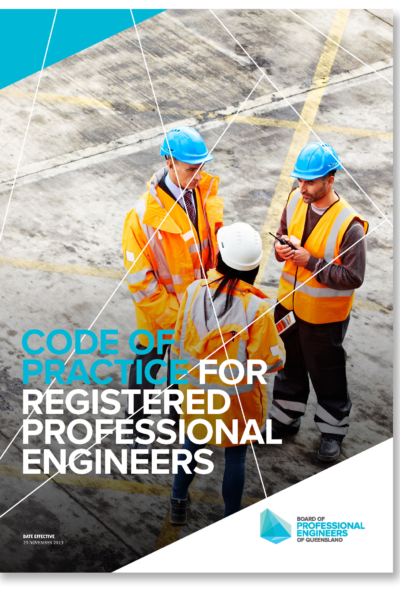06 Dec Understanding the Code of Practice for Registered Professional Engineers
BPEQ’s Code of Practice provides guidance to RPEQs about appropriate professional standards, conduct and practice.
A comprehensive understanding of BPEQ’s Code of Practice for Registered Professional Engineers is essential for all RPEQs, to help ensure they are practising in a professional and competent way and maintaining a high standard of professional conduct. This article will explain the purpose of codes of practice generally, provide general information about BPEQ’s Code of Practice, and explain how the Code can be used by RPEQs, BPEQ, and by the Queensland Civil and Administrative Tribunal in disciplinary proceedings.
A code of practice for a profession commits members of the profession to specific standards of conduct or practice. It is a set of written rules or guidelines that explains how members of a profession should behave or operate. It is prepared to provide practical advice to professionals about appropriate conduct or practice and achieving appropriate conduct in situations commonly encountered in professional practice, as well as preventative measures to avoid inappropriate conduct. Through its code of practice, a profession shows it recognises its responsibility to the public to ensure the actions of its professionals promote safety, integrity, and fairness, evidences its commitment to these things, and thereby encourages public confidence in the profession.
BPEQ’s Code of Practice is created and maintained pursuant to section 108(1) of the Professional Engineers Act 2002 , which requires BPEQ to make a code of practice for RPEQs to provide guidance to them as to appropriate professional conduct or practice. The stated objectives of the Code of Practice are to:

(a) achieve and maintain compliance with the Professional Engineers Act;
(b) set out the minimum levels of professional conduct required to be met by RPEQs; and
(c) assist the Queensland Civil and Administrative Tribunal in determining whether a RPEQ has behaved in a way that constitutes unsatisfactory professional conduct.
BPEQ must review the Code every three years in consultation with professional associations, universities, and other key stakeholders. In this way, appropriate professional conduct or practice is a dynamic concept, evolving in tandem with inevitable changes in the fast-paced world that is the engineering profession.
The Code contains both general and specific standards of conduct expected of RPEQs in professional practice. Some are stated in abstract, such as acting honestly and with integrity and fairness. Others are more specific, such as taking reasonable steps to be informed, and inform clients and employers of, the social, environmental, economic, and other possible consequences that might arise from professional engineering services. Finally, others are highly specific, such as the requirements incumbent on RPEQs regarding disclosure of actual or possible conflicts of interest and informing clients or employers about the consequences of disregarded advice. RPEQs should be aware that due to the varying degree of specificity of sections of the Code, both an abstract section and specific section could apply. It is therefore advisable for RPEQs to have a physical copy of the Code to hand for easy reference.
The Code can be used by RPEQs to inform their professional practice by acting as a litmus test for whether something is appropriate conduct or practice. If acting in a certain way is proscribed by the Code, then it can definitively be said that acting in that way would be inappropriate. BPEQ also uses the Code, to inform all stages of its consideration of disciplinary matters. In deciding whether to investigate the conduct of a RPEQ for a possible disciplinary ground, BPEQ will consider whether the available evidence establishes a prima facie breach of the Code. Investigations of the conduct of RPEQs will include investigation of whether any section of the Code has been contravened, and the Code will therefore inform BPEQ’s post-investigation disciplinary decision-making. Finally, the Code is used by the Queensland Civil and Administrative Tribunal in disciplinary proceedings. QCAT receives the Code of Practice from BPEQ as evidence of appropriate conduct or practice of RPEQs. QCAT must then have regard to the Code, and often uses it as a comparative to assist in determining the appropriate standard of conduct, whether the RPEQ the subject of the proceeding has fallen below the standard, and if so, the degree of the failing.
For more information contact admin@bpeq.qld.gov.au or read more about the Code of Practice.

 MY ACCOUNT
MY ACCOUNT
